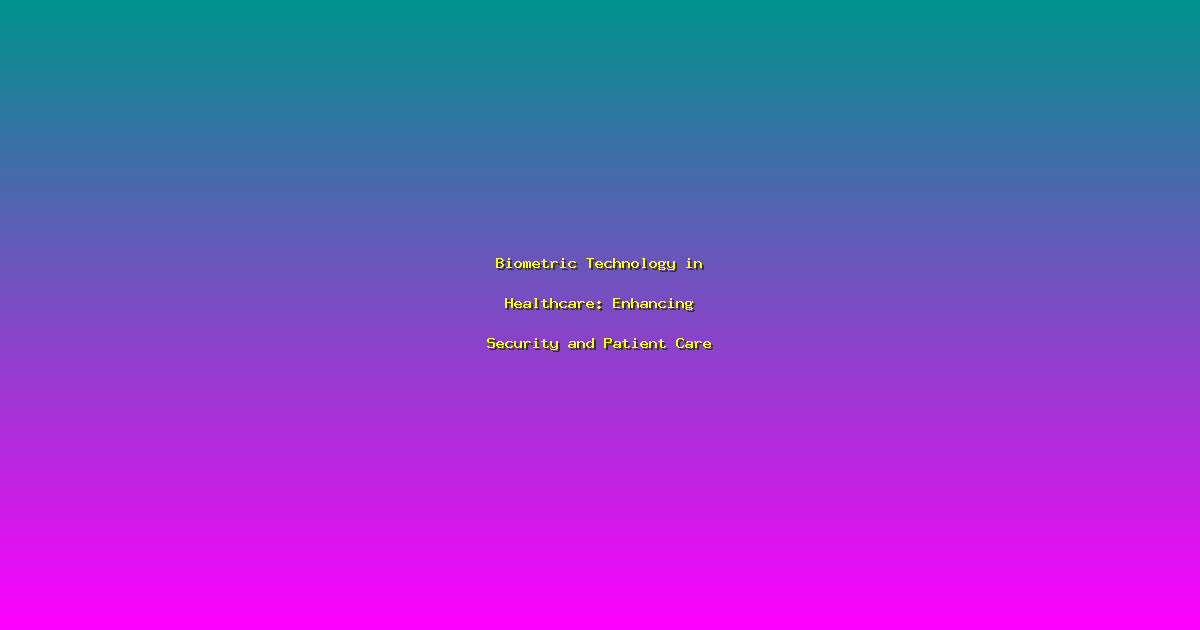Biometric Technology in Healthcare: Enhancing Security and Patient Care
Biometric technology has long been a subject of intrigue, from the futuristic visions of science fiction to the practical applications in today’s world. In healthcare, the integration of biometric technologies is transforming patient care and hospital operations, offering unprecedented levels of security and accuracy. This evolution is not just about securing sensitive medical records but also about providing personalized and efficient patient care. As we delve deeper into this topic, we’ll explore the various facets of biometric technology within the healthcare sector, its benefits, and the challenges it faces.
What is Biometric Technology?
Biometric technology refers to the use of unique biological characteristics to identify individuals. These characteristics can include fingerprints, iris patterns, facial features, and even voice patterns. The technology captures these biometric traits, converts them into digital form, and compares them with stored data to verify an individual's identity. In healthcare, this technology can significantly enhance patient identification processes, ensuring that the right treatment is provided to the right patient.
Enhancing Security in Healthcare
One of the primary advantages of biometric technology in healthcare is the enhancement of security. Traditional methods of patient identification, such as ID cards or passwords, can be easily lost, stolen, or shared. Biometric data, on the other hand, is unique to each individual and cannot be duplicated, making it a highly secure method of identification. This not only prevents unauthorized access to patient records but also reduces the risks associated with medical identity theft.
Improving Patient Care
Beyond security, biometric technology also plays a crucial role in improving the quality of patient care. With accurate identification, healthcare providers can access up-to-date and correct patient information, leading to more personalized treatment plans. This technology can also streamline hospital operations, reducing wait times and improving the overall patient experience. For example, biometric identification can be used to quickly and accurately identify patients at registration and check-in, allowing healthcare providers to focus more on providing care.
Challenges and Considerations
While the benefits of biometric technology in healthcare are clear, there are also challenges and considerations that must be addressed. Privacy concerns are paramount, as the collection and storage of biometric data require robust security measures to protect patient information. Additionally, the technology must be accessible to all patients, including those with disabilities, to ensure inclusivity. Ongoing research and development are critical to overcoming these challenges and maximizing the benefits of biometric technology in healthcare.
FAQs
Q: What types of biometric technologies are commonly used in healthcare?
A: Common types include fingerprint scanning, iris recognition, facial recognition, and voice recognition. Each technology has its own advantages and limitations.
Q: How does biometric technology improve patient safety?
A: By ensuring that patient identification is accurate, biometric technology helps prevent medical errors, such as administering the wrong medication or treatment, thus enhancing patient safety.
Q: Are there any legal or regulatory considerations for using biometric technology in healthcare?
A: Yes, healthcare providers must comply with various data protection laws, such as HIPAA in the U.S., which regulate the handling of personal and health information.
Q: Can biometric technology be used for remote patient monitoring?
A: Yes, biometric data can be collected remotely through wearable devices, which can be used to monitor patient health and detect anomalies in real-time.
Q: What are the future trends in biometric technology for healthcare?
A: Future trends include the integration of biometric technology with artificial intelligence and machine learning, which could lead to more sophisticated and personalized patient care solutions.
Conclusion and Call to Action
Biometric technology stands at the forefront of healthcare innovation, promising to enhance security and improve patient care. As the technology continues to evolve, it holds the potential to revolutionize how healthcare is delivered. For healthcare providers, embracing biometric technology can lead to more efficient, secure, and personalized patient care. Join the movement towards a safer and more efficient healthcare system by exploring how biometric technology can transform your practice.

